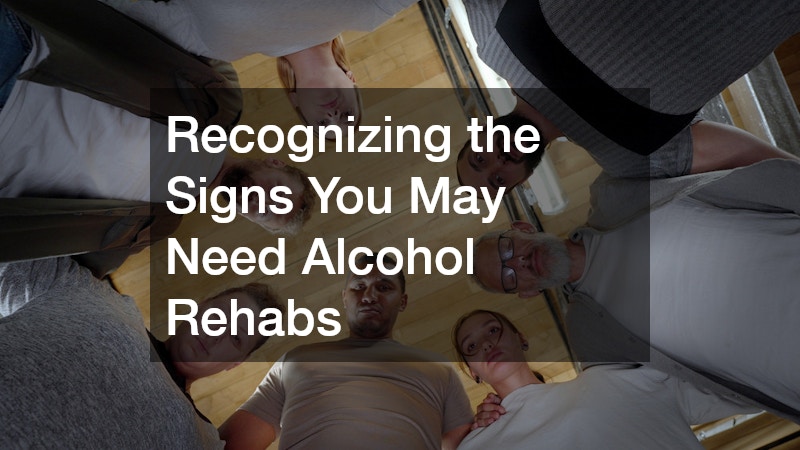
Alcohol is deeply embedded in social culture, from celebrations to casual gatherings. For many, drinking is occasional and controlled. But for others, alcohol consumption begins to take a more dominant role, affecting health, relationships, and daily responsibilities. Knowing when casual use has crossed the line into harmful dependence is not always easy. Recognizing the warning signs is an important step toward getting the right support, including professional help through alcohol rehabs.
Increased Tolerance and Dependence
One of the earliest red flags of a developing alcohol problem is tolerance. This occurs when the body becomes accustomed to alcohol, requiring larger amounts to achieve the same effects. For example, a person who once felt relaxed after a single drink may find themselves needing three or four. Over time, tolerance can transition into dependence, where drinking becomes a regular part of daily life rather than an occasional choice. Dependence often leads to cravings and difficulty cutting back despite the desire to do so.
Loss of Control
Another key sign is the inability to control alcohol intake. This can look like setting limits—such as deciding to have only two drinks at a gathering—only to exceed them every time. Some individuals may even attempt to stop drinking altogether but find themselves slipping back into old patterns within days or weeks. This cycle of failed attempts to moderate or quit is a clear indication that outside help may be necessary.
Withdrawal Symptoms
When someone has been drinking heavily for a prolonged period, the body becomes used to functioning with alcohol in its system. If that person suddenly reduces or stops drinking, withdrawal symptoms may occur. These can range from mild—such as irritability, anxiety, or trouble sleeping—to more severe issues like sweating, nausea, tremors, and even seizures. Experiencing withdrawal symptoms is a strong indication that alcohol has created a physical dependency, and professional supervision may be required to manage it safely.
Neglecting Responsibilities
Alcohol misuse often shows itself in how it impacts daily life. A person may begin to miss work, neglect family duties, or ignore household responsibilities. Tasks that were once simple, such as attending meetings or keeping up with chores, may feel overwhelming or unimportant compared to drinking. When alcohol begins interfering with obligations and priorities, it is a sign that the balance between use and life responsibilities has tipped dangerously.
Relationship Strain
Strained relationships are another common signal. Alcohol misuse can lead to arguments, secrecy, and broken trust among family members, friends, or partners. Loved ones may express concern, frustration, or even distance themselves. Over time, relationships can deteriorate under the weight of conflict and disappointment. If alcohol is at the center of repeated disagreements or if loved ones have urged someone to seek help, it is a strong sign that professional treatment may be needed.
Risky Behaviors
Another serious warning sign is engaging in risky behaviors while drinking or because of drinking. This might include driving under the influence, getting into physical altercations, or making unsafe choices that would not normally occur when sober. These actions not only endanger the individual but also put others at risk. A pattern of risky behavior tied to alcohol use highlights the urgent need for intervention.
Decline in Physical Health
Alcohol affects nearly every system in the body, and prolonged misuse can take a visible toll. Frequent hangovers, unexplained fatigue, digestive problems, and changes in appetite may be early indicators. Over time, the risks grow more serious, potentially impacting the liver, heart, and brain. While some damage may not be immediately noticeable, a persistent decline in health tied to drinking is a strong warning that help should be sought sooner rather than later.
Mental Health Struggles
Alcohol and mental health are closely linked. People may initially use alcohol as a way to cope with stress, anxiety, or depression. However, long-term misuse often worsens these conditions. Alcohol can intensify feelings of sadness, irritability, or hopelessness. It may also interfere with healthy sleep patterns, leading to fatigue and emotional instability. If someone notices that their mental well-being is declining alongside their drinking habits, it may be a sign that alcohol is no longer just a coping mechanism but a destructive force.
Isolation and Secrecy
As alcohol use becomes more problematic, individuals may begin to hide their drinking from others. This secrecy often stems from shame, fear of judgment, or denial of the severity of the problem. Isolation may also occur, with a person withdrawing from social activities they once enjoyed, either because alcohol is not involved or because they prefer drinking alone. Secrecy and isolation are strong signals of unhealthy drinking patterns that require outside support.
Denial of the Problem
Perhaps one of the clearest indicators is denial. Even when faced with negative consequences—such as damaged relationships, health concerns, or workplace warnings—someone struggling with alcohol may insist that they do not have a problem. This refusal to acknowledge the impact of alcohol can prevent meaningful change and highlights the importance of professional guidance.
Taking the Next Step
Recognizing these signs is not about placing blame but about understanding when drinking has crossed into dangerous territory. If you or someone you know is showing these warning signals, it may be time to explore professional help. Alcohol rehabs provide structured programs, medical supervision, and emotional support designed to help individuals break free from dependence and build healthier lives.
Alcohol misuse often develops gradually, making it difficult to spot until the effects are undeniable. Signs such as increased tolerance, loss of control, withdrawal symptoms, strained relationships, declining health, and risky behaviors serve as clear warnings. Acknowledging these red flags is the first step toward recovery. Seeking professional help through alcohol rehabs can provide the tools, structure, and support needed to regain control, repair relationships, and restore overall well-being.




